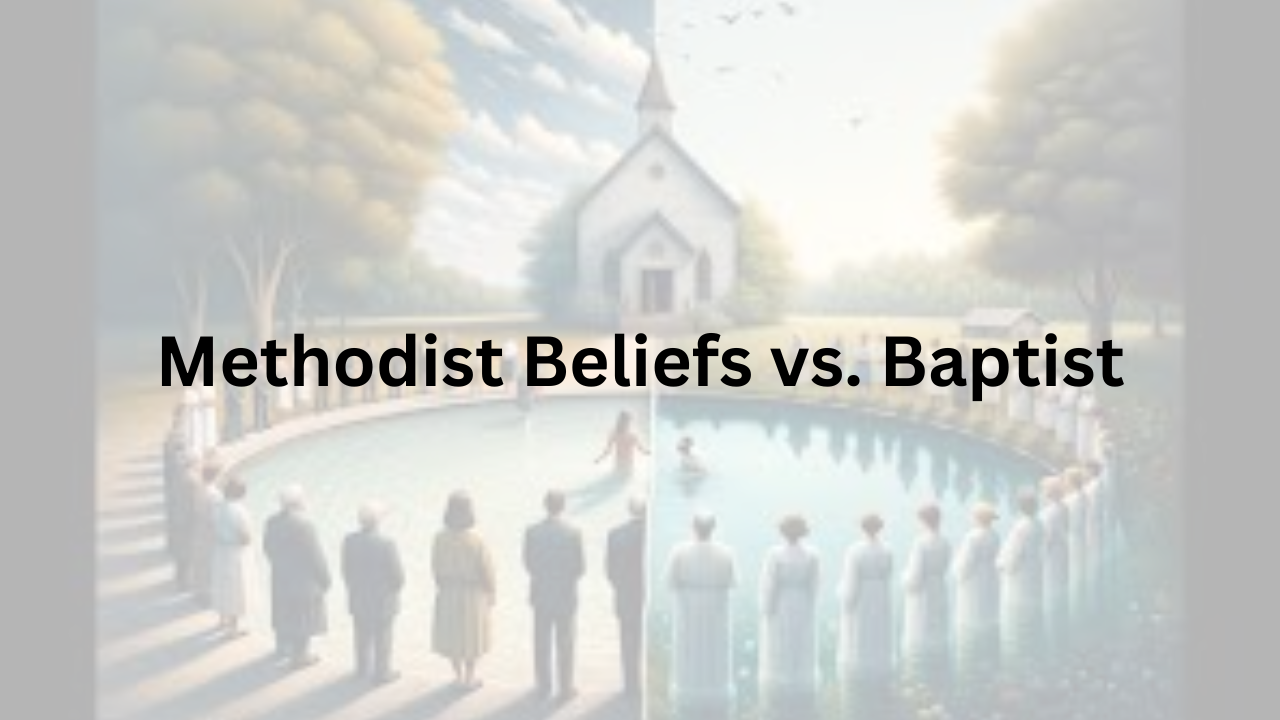Introduction: Methodist Beliefs vs Baptist
Christianity is like a big family with many different groups, called denominations. Each group has its own special beliefs and ways of worship. Two important groups in this family are the Methodists and the Baptists. In this article, we will look at “Methodist beliefs vs. Baptist” to understand how they are alike and how they are different.
Brief Overview of Christianity’s Denominational Diversity
Christianity has many branches, each with unique beliefs and practices. Some of the main branches include Catholicism, Eastern Orthodoxy, and Protestantism. Within Protestantism, there are many groups like Methodists, Baptists, Lutherans, and Presbyterians.
Introduction to Methodism and Baptism as Two Prominent Protestant Traditions
Methodism began in the 18th century with John Wesley. It focuses on personal faith and helping others. Baptists started earlier, in the 17th century, and emphasize individual belief and baptizing those who choose to believe.
Purpose and Scope of the Comparative Analysis
The goal of this article is to compare “Methodist beliefs vs. Baptist” beliefs. We will look at their histories, main ideas, and ways of worship. This will help us see how these two groups are similar and different.
Comparison : Methodist Beliefs vs Baptist
| Aspect | Methodists | Baptists |
|---|---|---|
| Origin | Began in the 18th century with John Wesley | Emerged in the 17th century |
| Baptism | Baptize individuals of any age; view it as a sign of grace | Baptize only those who profess faith; view it as symbolic |
| Salvation | Believe one can fall from grace and lose salvation | Generally believe in “once saved, always saved” |
| Worship Style | Structured services with hymns and prayers | Less formal services focusing on sermons |
| Church Governance | Episcopal structure with bishops | Congregational autonomy; each church governs itself |
Historical Background of Methodism and Baptism
Understanding the origins of Methodism and Baptism helps us see how their beliefs and practices developed. This section explores the beginnings and growth of both traditions.
Origins and Development of Methodism
Methodism started in the 18th century. John Wesley, an English preacher, began this movement. He wanted to renew the Church of England by focusing on personal faith and helping others. Wesley emphasized living a holy life and caring for those in need. He believed that true faith should lead to good actions, like feeding the hungry and helping the poor.
Origins and Development of Baptism
Baptists emerged in the early 17th century. They believed that only those who personally choose faith should be baptized. This is called “believer’s baptism.” They practiced baptizing by fully immersing a person in water. Baptists also valued the independence of each local church, meaning each congregation made its own decisions.
Comparison : Methodist Beliefs vs Baptist
| Aspect | Methodists | Baptists |
|---|---|---|
| Origin | Began in the 18th century with John Wesley | Emerged in the 17th century |
| Baptism | Baptize individuals of any age; view it as a sign of grace | Baptize only those who profess faith; view it as symbolic |
| Salvation | Believe one can fall from grace and lose salvation | Generally believe in “once saved, always saved” |
| Worship Style | Structured services with hymns and prayers | Less formal services focusing on sermons |
| Church Governance | Episcopal structure with bishops | Congregational autonomy; each church governs itself |
Core Theological Beliefs: Methodist Beliefs vs Baptist
Understanding the core beliefs of Methodists and Baptists helps us see how these two Christian groups are alike and different. This section will look at their main ideas about faith and practice.
Methodist Beliefs
- Prevenient Grace and Free Will: Methodists believe that God’s love reaches out to everyone before they are aware of it. This is called prevenient grace. They think people have the free will to accept or reject this grace.
- Possibility of Falling from Grace: Methodists believe that it’s possible for someone to turn away from their faith after being saved. This means they think a person can lose their salvation if they choose to reject God later.
- Inclusive Approach to Sacraments: Methodists practice two main rituals, called sacraments: baptism and communion. They baptize people of all ages, including babies, and accept different methods like sprinkling or pouring water. They also invite all believers to participate in communion.
Baptist Beliefs
- Authority of Scripture: Baptists believe that the Bible is the ultimate guide for their faith and actions. They look to it as the final authority in all matters.
- Believer’s Baptism by Immersion: Baptists practice baptism only for individuals who personally choose to believe in Jesus. They perform baptism by fully immersing the person in water. They do not baptize infants.
- Doctrine of “Once Saved, Always Saved”: Many Baptists hold the belief that once a person is truly saved, they cannot lose their salvation, no matter what happens afterward. This is often summarized as “once saved, always saved.”
Comparison : Methodist Beliefs vs. Baptist
| Aspect | Methodists | Baptists |
|---|---|---|
| Grace and Free Will | Believe in prevenient grace; individuals can accept or reject God’s offer | Emphasize individual decision to accept faith |
| Salvation Security | Believe it’s possible to fall from grace and lose salvation | Generally believe in “once saved, always saved” |
| Sacraments | Practice baptism (including infants) and communion; inclusive approach | Practice believer’s baptism by immersion; communion for baptized believers |
| Scripture Authority | View the Bible as a primary guide, interpreted through tradition and reason | Hold the Bible as the sole authority in matters of faith and practice |
Worship Practices and Sacraments: Methodist Beliefs vs Baptist
Methodists and Baptists have different ways of worship and understanding sacraments. Let’s explore these differences to understand “Methodist beliefs vs. Baptist” in this area.
Methodist Worship and Sacraments
- Structured Liturgy with Hymns and Prayers: Methodist services are organized with a set order. They include singing hymns, reading prayers, and listening to sermons. This structure helps worshippers connect with God.
- Practice of Open Communion: In Methodist churches, everyone who believes in Jesus can take part in communion. This means you don’t have to be a member of the Methodist Church to join in this sacred meal.
- Baptism of Individuals at Any Age: Methodists baptize people of all ages, including babies, children, and adults. They believe baptism welcomes a person into the church family. They may use different methods like sprinkling water, pouring it, or full immersion.
Baptist Worship and Sacraments
- Less Formal, Sermon-Centric Services: Baptist services are usually less formal. They focus mainly on the sermon, where the pastor teaches from the Bible. There is also singing, but the main part is the preaching.
- Closed Communion for Baptized Members: In many Baptist churches, only those who have been baptized as believers can take part in communion. This practice is called closed communion. It means that to join in, you need to have been baptized in the same way and be a member of that church or a similar one.
- Baptism Exclusively for Professing Believers: Baptists believe that only people who are old enough to understand and profess their faith should be baptized. They do not baptize infants. Baptism is done by fully immersing the person in water, symbolizing their faith in Jesus.
Comparison : Methodist Beliefs vs. Baptist
| Aspect | Methodists | Baptists |
|---|---|---|
| Worship Style | Structured services with hymns and prayers | Less formal services focusing on sermons |
| Communion Practice | Open communion for all believers | Closed communion for baptized members |
| Baptism Practice | Baptize individuals of any age; various methods | Baptize only professing believers; by full immersion |
Church Governance and Structure: Methodist Beliefs vs Baptist
Methodists and Baptists organize their churches in different ways. Understanding these structures helps us see the differences in “Methodist beliefs vs. Baptist.”
Methodist Church Governance
- Episcopal Hierarchy with Bishops: Methodists have a leadership system with bishops at the top. Bishops are chosen to guide and oversee the church’s activities. They provide spiritual leadership and ensure that church teachings are followed.
- Connectional System Linking Congregations: Methodist churches are connected in a network. This means local churches work together and support each other. Decisions are made through conferences that include both church leaders and members.
Baptist Church Governance
- Congregational Autonomy: Baptist churches are independent. Each local church makes its own decisions without outside control. This means they govern themselves and handle their own affairs.
- Independence in Pastoral Selection and Decision-Making: In Baptist churches, members choose their pastors. They also make important decisions together, like setting church rules and planning activities. This ensures that each congregation directs its own path.
Comparison : Methodist Beliefs vs. Baptist
| Aspect | Methodists | Baptists |
|---|---|---|
| Leadership Structure | Episcopal system with bishops overseeing multiple congregations | Congregational autonomy with each church self-governing |
| Decision-Making Process | Decisions made through conferences connecting various church levels | Decisions made by individual congregations without external interference |
Social and Cultural Perspectives: Methodist Beliefs vs Baptist
Methodists and Baptists approach social and cultural issues differently. Understanding these differences helps clarify “Methodist beliefs vs. Baptist” in societal engagement.
Methodist Engagement in Social Issues
- Active Involvement in Social Justice Initiatives: Methodists have a history of participating in social justice causes. They often support efforts to promote equality and help those in need. This involvement reflects their belief in applying faith to improve society.
- Progressive Stances on Contemporary Issues: Many Methodist groups take progressive positions on modern topics. They may support social reforms and advocate for inclusive policies. This approach shows their commitment to adapting faith to current societal contexts.
Baptist Engagement in Social Issues
- Focus on Individual Morality and Evangelism: Baptists emphasize personal faith and sharing their beliefs with others. They prioritize individual moral conduct and the importance of personal conversion experiences.
- Generally Conservative Positions on Social Matters: Many Baptist groups hold traditional views on social issues. They often uphold conservative values and may resist progressive changes in society. This stance reflects their commitment to maintaining established beliefs.
Comparison : Methodist Beliefs vs. Baptist
| Aspect | Methodists | Baptists |
|---|---|---|
| Social Engagement | Active in social justice initiatives | Focus on individual morality and evangelism |
| Stance on Contemporary Issues | Often progressive and supportive of social reforms | Generally conservative, upholding traditional values |
Conclusion: Methodist Beliefs vs Baptist
In exploring “Methodist beliefs vs. Baptist,” we’ve identified key differences and similarities between these two Protestant traditions.
Summary of Key Differences and Similarities
| Aspect | Methodists | Baptists |
|---|---|---|
| Baptism | Practice infant baptism; accept various modes (sprinkling, pouring, immersion) | Practice believer’s baptism by immersion only; reject infant baptism |
| Church Governance | Episcopal structure with hierarchical leadership | Congregational autonomy; each church self-governing |
| Social Engagement | Active in social justice initiatives; often hold progressive views | Emphasis on individual morality and evangelism; generally conservative |
| Theological Emphasis | Focus on prevenient grace and free will | Emphasis on authority of Scripture and believer’s baptism |
Reflection on Diversity within Protestant Christianity
These differences highlight the rich diversity within Protestant Christianity. Each tradition offers unique perspectives and practices, contributing to the broader Christian faith.
Encouragement for Mutual Understanding and Respect
Recognizing these distinctions encourages mutual understanding and respect. By appreciating each other’s beliefs and practices, Methodists and Baptists can foster unity and collaboration within the Christian community.



